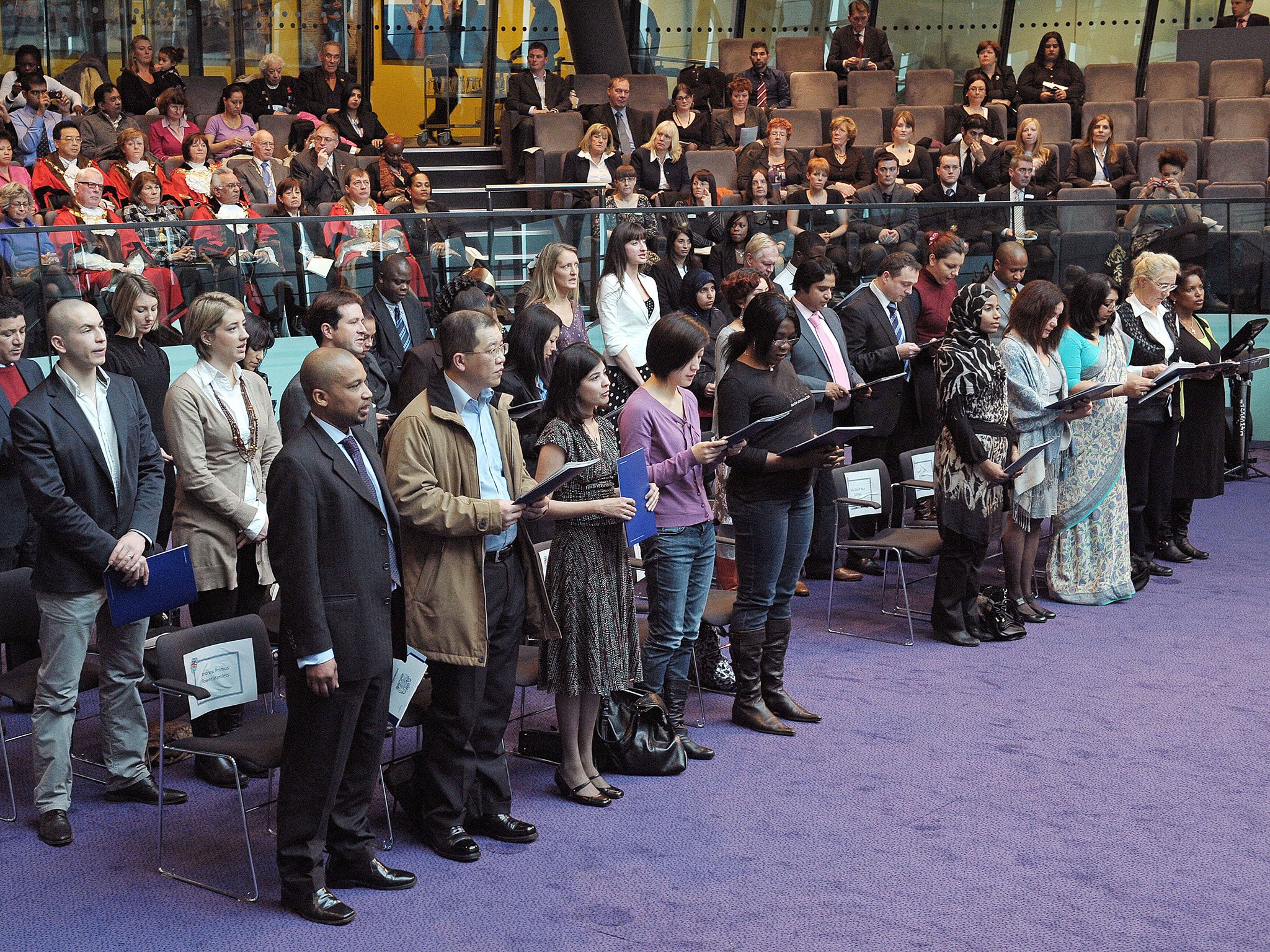EU referendum: Worried EU nationals dash for UK citizenship amid Brexit fears
Publisher of textbooks preparing candidates for citizenship tests said sales had quadrupled since EU referendum announcement

Surging numbers of applications for British citizenship have been submitted by European Union nationals alarmed that a Brexit vote could jeopardise their status in this country, it has emerged.
A publisher of textbooks preparing candidates for citizenship tests said sales had quadrupled since it became clear that David Cameron would hold his promised EU membership referendum in June.
Red Squirrel Publishing said it sold 2,270 copies of its titles in January and 2,179 last month – compared with 570 in December – and has ordered an emergency reprint.
Immigration lawyers have warned that a Leave vote could leave some EU nationals without an automatic right to stay in Britain, meaning they would have to apply for a visa to continue living and working in this country.
The lawyers have urged people worried about their status to consider applying for a British passport. More than two million EU nationals are living in Britain, with Poles representing the largest group. There are also increasing numbers from southern European nations such as Portugal, Spain and Greece.
Fears raised by EU migrants about the impact of Brexit include the threat of being ordered out of the country, losing reciprocal healthcare arrangements and facing long queues at border controls at ports and airports.
George Sandison, the managing editor of Red Squirrel, said the company was rushing through a reprint of its guides to meet the demand for copies. “The announcement of the referendum date has definitely brought home just how uncertain the future is,” he said. “The process for obtaining British citizenship is time-consuming, so it is no surprise that people are suddenly looking to complete this process as quickly as possible.”
Hayk Sayadyan, an immigration specialist at Gulbenkian Andonian Solicitors in London, said anxiety over the UK’s future in the EU was among the factors behind a surge in citizenship applications.
“People prefer stability,” he said. “Inevitably, the uncertainty that is entailed in this vote carries a degree of discomfort and concern for people.”
To qualify for permanent residency or a UK passport, candidates have to score 75 per cent in questions covering British history, culture, law and government. They also have to have lived in this country for at least five years, and pass an English language test.
Meanwhile, Ireland’s Department of Foreign Affairs disclosed last week that the number of people born in England, Scotland or Wales applying for passports on the grounds of family links increased sharply last year. It recorded a 33 per cent rise in applications from people with an Irish-born grandparent and an 11 per cent rise from people with an Irish-born parent.
Anyone born in Northern Ireland has the automatic right to claim Irish citizenship. Last year applications for Irish passports from the province rose by 14 per cent.
Case study: ‘Migrants being fed scare stories’
A 39-year-old Slovakian woman, who works on outreach programmes that help EU migrants, said she had been inundated with requests from people inquiring about taking British citizenship.
Almost every day now people are emailing me, or sending messages on our Facebook page, asking about taking the test because they are so concerned about what will happen to them.”
The Manchester-based woman, who did not want to be named, criticised British colleagues of EU migrants for feeding them scare stories about what would happen to them following a Brexit.
“I had one guy who works in hospitality saying that people he works with were telling him he will get sent home but I tell them it’s not so easy to do.
“It’s no wonder so many people want to find out more about the citizenship test with all of that going on.”

Case study: ‘You have to be British for the system to work’
Anna Raffetti, 27, from Italy, has been living and working in the UK for almost five years.
I had been thinking about taking the test for about a year, well before the EU referendum date was announced,” she said. “But I’d say those thoughts have speeded up recently.
“I’ve seen how difficult it is for Europeans here in the UK. For the system to work for you, you have to be British. What matters is being British, not European.”
Ms Raffetti, who lives in Hertford and works for a charity in Haringey, north London, said she would apply for permanent residency status in September on the fifth anniversary of her arrival.
“It costs £65 and it means you can stay in this country,” she said. “You have to wait another year after that to apply for citizenship, so I’ll be taking my test in 2017.”
Join our commenting forum
Join thought-provoking conversations, follow other Independent readers and see their replies
Comments
Bookmark popover
Removed from bookmarks